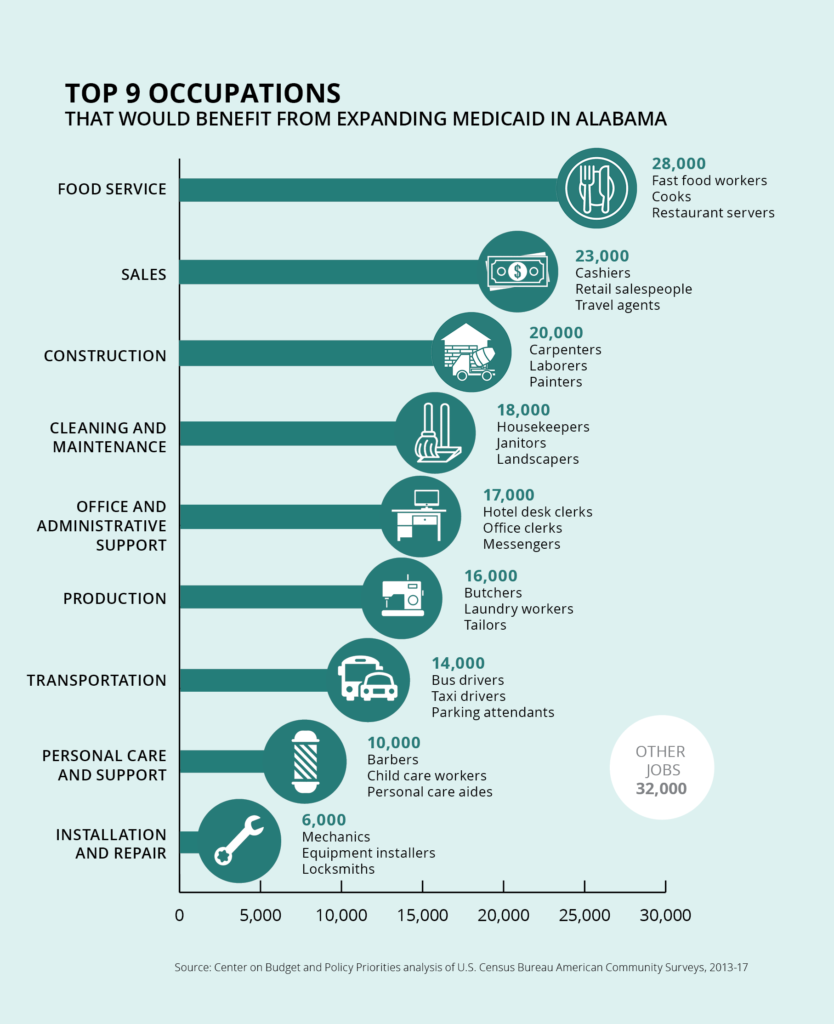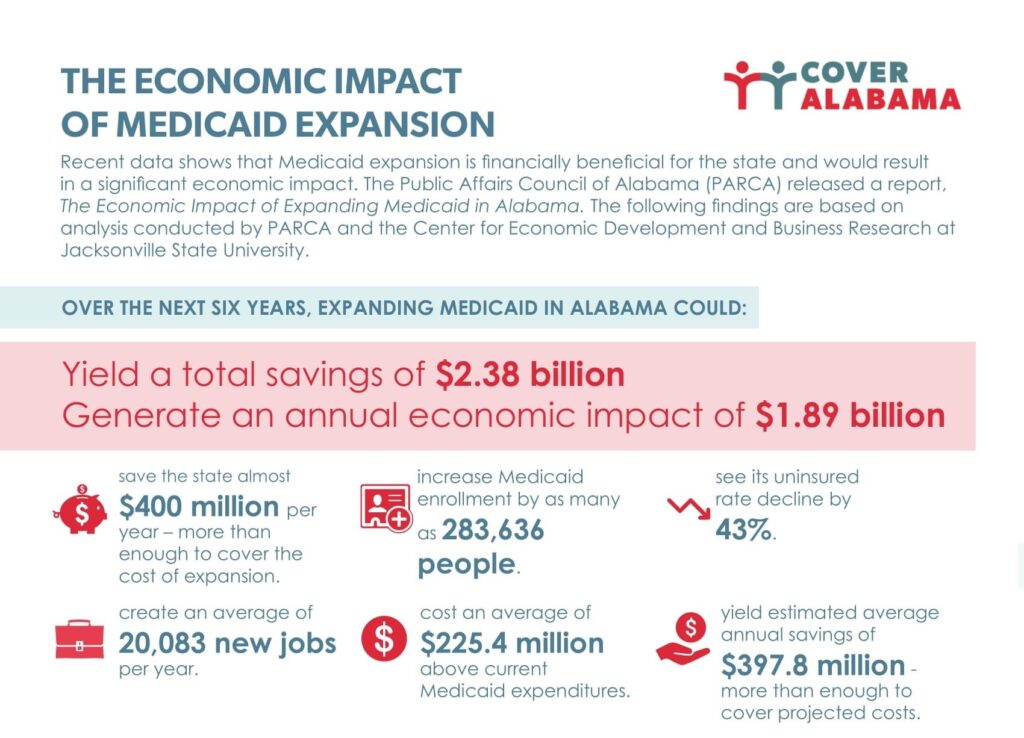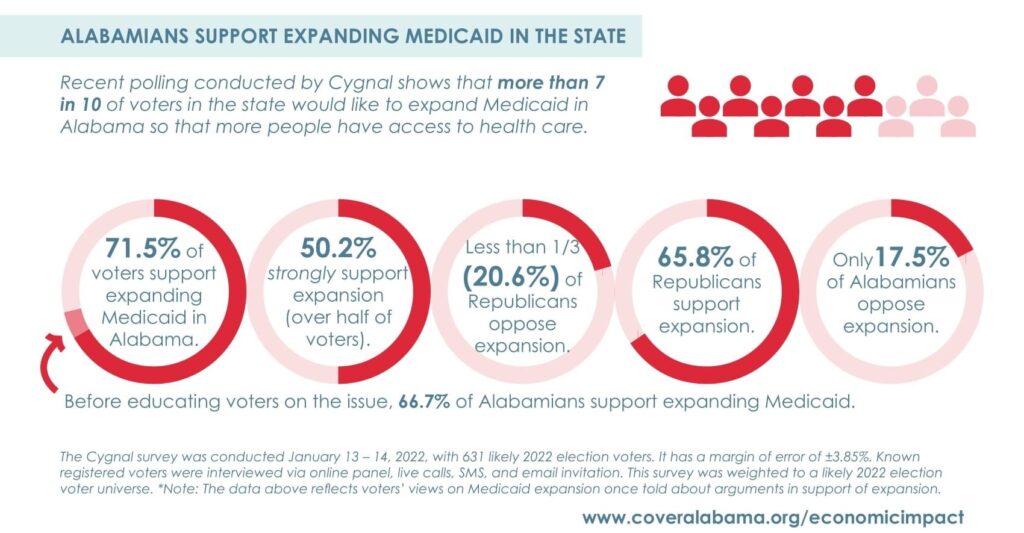The workforce benefits of Medicaid expansion in Alabama
For nearly a decade, Alabama has been outside looking in on a good deal. While hundreds of thousands of Alabamians continue to struggle without health insurance, state leaders have failed to expand Medicaid. A few loud voices have politicized an issue that never should have been political. and our state has paid the price in lost dollars, lost jobs and lost lives.
Strong evidence suggests that having reliable access to health care encourages folks to work and keeps workers healthy. That’s one reason 39 states and the District of Columbia have recognized the importance of Medicaid expansion. They have chosen to ensure their residents can afford necessary medical care. They have prioritized a healthy populace and a stronger workforce over partisan politics.
Alabama is one of 11 states that has yet to expand Medicaid. and that inaction has left more than 220,000 Alabamians in a health coverage gap. A family of three must make less than $4,475 a year ‒ just 18% of the federal poverty level ‒ for the parents to qualify for Alabama Medicaid. But unless that family makes at least $24,860 a year, they will not qualify for subsidies to buy a private plan on the marketplace created under the Affordable Care Act.
Medicaid expansion would end that injustice and close that large coverage gap for adults with low incomes. It is the single best solution available for lawmakers to strengthen Alabama’s ailing health care system. and it is one of the best solutions to help cure many of our state’s economic and workforce woes.
Medicaid expansion would help Alabamians stay in the workforce
Some state officials have expressed concerns about Alabama’s labor force participation rate, which is lower than in many neighboring states. Fortunately, Medicaid expansion is a proven solution to help people join and stay in the workforce. States that have expanded Medicaid have seen a greater increase in labor force participation among people with incomes below 138% of the poverty line than states that have not expanded. These are the very people Alabama would help by closing the coverage gap.
As lawmakers grapple with how to increase workforce participation, it’s worth considering how many Alabamians have had to leave their jobs due to ailments that access to adequate health care could help prevent or solve. One in three adults in Alabama have a disability, according to 2022 CDC data, including nearly two out of every five veterans. Here, too, Medicaid expansion would help. People with disabilities are more likely to be employed in states that have expanded Medicaid than in states that haven’t.
The personal and economic harms of being uninsured are all too real. For many folks, going without health coverage means going without treatment for manageable illnesses and injuries. Those conditions often turn into long-term problems that prevent them from living healthy lives or returning to work. For example, imagine being an uninsured person with diabetes, a condition affecting nearly one in seven Alabamians. While severe, diabetes is detectable and treatable with regular care. However, if untreated, it can cause disability or long-term and permanent damage like foot amputation or vision loss.
That person is now living a more difficult life, and returning to work is now more difficult, if not impossible. These are the kinds of situations that uninsured Alabamians face every day. and expanding Medicaid coverage could prevent this type of needless suffering.
Health care policy is workforce policy
As Alabama works hard to attract industries and new workers, adequate health coverage is essential infrastructure. Why would a family move to Alabama (instead of elsewhere) for employment opportunities when our state refuses to invest in workers’ health like so many other states do? and how long will businesses keep relocating to Alabama if our workforce isn’t healthy enough to fill vacant jobs? They could just as easily go to Arkansas, Louisiana, Kentucky, Missouri, Oklahoma, Virginia or West Virginia instead.
These mostly conservative Southern states all recognized the importance of a healthy workforce and chose to expand Medicaid. That’s because it is impossible to separate health care policy from workforce policy. In fact, health care policy is workforce policy.
Medicaid expansion would help working Alabamians stay healthier and more productive. Expansion also likely would boost labor force participation in Alabama, as it has in other states. Arguments to the contrary lack strong evidence and rely on false stereotypes about low-wage workers.
Many of the Alabamians who stand to benefit most from Medicaid expansion are working folks caught in the coverage gap. Having access to health insurance, regardless of the source, doesn’t keep people from working. But you know what does? Having an unhealthy workforce with folks who struggle to afford health care and are forced to work when they’re sick. Or worse: being pushed out of the workforce entirely due to ailments that worsen or go unaddressed because people can’t afford treatment for them.
Medicaid expansion would keep a wide range of workers healthier
Alabamians work hard every day to provide for themselves and their families. But hundreds of thousands of them aren’t paid enough to afford health coverage. Fast food workers, cashiers, carpenters and hotel desk clerks are just a few examples of the people who work hard at low-paying but essential jobs that often don’t provide health insurance. They are among the Alabamians who would benefit most from expanding Medicaid.
The false belief that expanding health coverage would somehow disincentivize work is insulting to Alabamians who work every day to provide for their families but don’t receive health insurance through their employers. Improving health care access is workforce development, and having health insurance makes working possible.
Likewise, the unfounded notion that many people would drop out of the workforce after gaining health coverage is not grounded in reality. In fact, it is fundamentally rooted in outdated, false stereotypes about people with low incomes. and it takes an absurdly reductive view of the economic realities of everyday life.
Health insurance helps people get health care, but it doesn’t pay for other needs like food, clothing or housing. Indeed, many Alabamians who want a job can’t enter the workforce ‒ or have to leave it ‒ because they can’t afford the health care they need to stay healthy enough to work.
Other states have shown Medicaid expansion is an economic boost
For 12 years, Alabama has failed to accept generous federal incentives to expand Medicaid to cover adults with low incomes. In that time, our lawmakers have watched as other fiscally conservative states (including Kentucky, Louisiana, Montana and Utah) expanded Medicaid and remained budgetarily sound. For a decade, expansion states have enjoyed budget savings, revenue gains and overall economic growth after expansion.
National research has shown no significant increases in spending from state funds as a result of Medicaid expansion. These positive effects occurred in expansion states even as Medicaid enrollment growth initially exceeded projections in many states.
Examples abound. Studies in Louisiana and Montana showed that expansion pumped large amounts of federal money into those states’ economies and produced significant state budget savings. In Kentucky, Medicaid expansion infused $1.16 billion into the state’s health care system and overall economy in the first year of expansion. Similarly, after Medicaid expansion, Louisiana also showed increases in overall state and local tax receipts.
Every year that Alabama has refused to expand Medicaid, Alabamians’ federal tax dollars have helped foot the bill for Medicaid expansion in other states. More than 220,000 Alabamians remain caught in a health coverage gap that expansion would close. Another 120,000 who would benefit from expansion continue to stretch to pay for coverage they can’t truly afford. All the while, our tax dollars are being used to fund expansion elsewhere.
Medicaid expansion would make economic sense for Alabama
Expansion opponents sometimes acknowledge the financial benefits of expanding Medicaid. But they often underplay the magnitude of these potential gains. Medicaid expansion could save Alabama nearly $400 million a year over the next six years, a report by the Public Affairs Research Council of Alabama (PARCA) found.
Those savings ‒ from the federal government covering expenses that Alabama now pays ‒ would be more than enough to cover the state cost for expansion, according to PARCA. Medicaid expansion also would generate nearly $2 billion of annual economic growth for Alabama during those six years, PARCA projected.
The benefits wouldn’t stop there. Medicaid expansion also would support more than 20,000 new jobs a year on average, PARCA projected. It would extend health coverage to more than 220,000 folks who don’t have it. and most importantly, it would save lives.
Expanding Medicaid would save the state money, boost economic growth and create jobs. For many newly insured Alabamians, Medicaid coverage would help them stay healthy enough to keep working. For others, it would provide the medical security they need to join or rejoin the workforce.
Alabama can’t afford not to expand Medicaid
Alabamians with low incomes pay twice the share of income in state and local taxes that the wealthiest households pay. Adding to that injustice, Alabama’s overall tax system raises much less money for vital public services than most other states. In 2019, only about 38% of our state revenue came from state taxes ‒ one of the lowest percentages in the nation. Meanwhile, Alabama gets almost as much of its revenue (nearly 37%) from federal funds.
Federal funds are already a significant source of state revenue in Alabama and have been for decades. That money has helped us meet vital needs like educating our children, maintaining our roads and keeping our water clean.
Medicaid expansion would meet another vital need for our state: saving and improving lives. When it comes to expansion, Alabama would be getting a fantastic deal: a 9-to-1 federal match of state funds. That’s nearly 20 percentage points higher than the matching rate Alabama usually gets for other Medicaid services. and as already mentioned, Medicaid expansion could save Alabama enough money on other services to cover most or all of the state cost.
Why not take the 90% the federal government is offering to fund Medicaid expansion in exchange for a 10% state match? Why not invest in a healthier future for Alabama?
Alabamians across the political spectrum agree: It’s time to expand Medicaid
While some have tried to make Medicaid expansion into a partisan issue, it simply isn’t. Several other Southern states, and conservative states elsewhere in the country, already have expanded Medicaid. Some even did so by bypassing their state legislatures through ballot measures (an option we lack in Alabama). This isn’t a partisan issue, though many in our state want to make it one.
To argue that we shouldn’t help our neighbors see a doctor based on the false premise that it might encourage them not to work is deeply troubling. Is that the state we want to be: one that pits the health of its people against cynical political posturing? That’s not what Arise wants, and it’s not what the vast majority of Alabamians want either.
Alabama is one of only 11 states that have not yet accepted the generous federal incentives to expand Medicaid. Most people across our state want that to change. More than seven in 10 Alabamians (71.5%) support Medicaid expansion, an Arise poll found last year. That includes nearly two-thirds of Republican voters.
Alabama needs to do the right thing by prioritizing the health of our people and our workforce over the political gamesmanship that so often dictates state decision-making. It’s time to ensure health coverage for all of our neighbors who can’t afford it.
It’s the only decision that makes sense, and it’s a choice that would help make this the state our people deserve. Let’s put the people of Alabama first and expand Medicaid.




